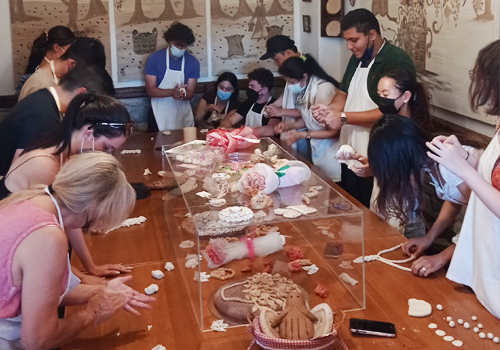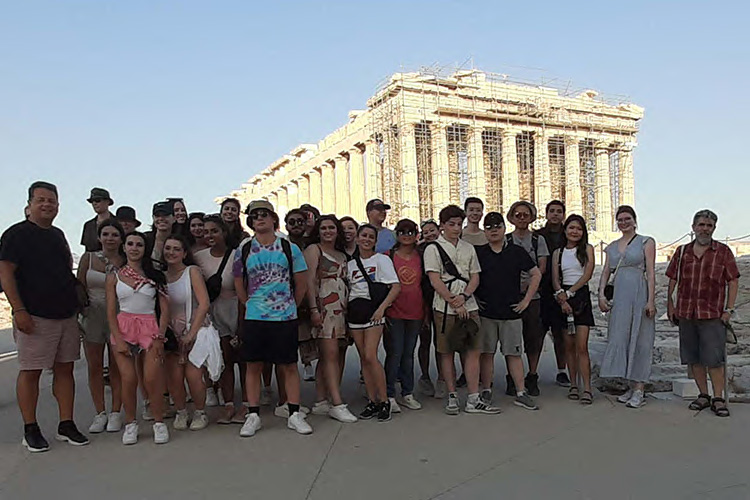This summer, Joe Zi Zhou travelled 8000 kilometers to attend class. But he had no complaints about the commute: in fact, it led to what he calls a “life-changing experience.”
A psychology major and member of Woodsworth College, Zhou was one of 25 students enrolled in this year’s U of T Summer Abroad class in Greece. The course he took — Modern Greek Culture: People, Tradition, Languages & Cuisine — was taught by Themistoklis Aravossitas, who teaches modern Greek language and culture at the Centre for European, Russian & Eurasian Studies in the Munk School of Global Affairs & Public Policy.
Over the course of four weeks, Aravossitas’s students were given a unique chance to learn about the history and contemporary reality of a nation that has made essential contributions to philosophy, science, architecture, history, music, literature and politics. Travelling from the capital of Athens to coastal towns and mountain villages, they gained both a fundamental understanding of ancient history and a thorough lesson in how Greeks live today.

“This course allowed us to experience local culture, interact with local people, and of course, taste authentic, affordable local foods,” says Zhou. “I came to Greece knowing little about this land, but left with so many fond memories and a deeper understanding of its history, culture, language and people.”
Since 1972, Summer Abroad — a program administered by Woodswoth College — has been one of U of T’s most cherished institutions, enabling students to earn a full-year credit in international locations which become their “living textbooks.” While the pandemic temporarily put a stop to in-person trips, they are now back. And as he reflects on a summer teaching Modern Greek Culture for the second time, Arovassitas couldn’t be happier.
With a PhD in curriculum teaching and learning from OISE, he has given much thought to how students learn best. “The most successful form of education is what we call ‘situated’ or experiential learning,” he says, adding that Summer Abroad’s collaborative aspect is also important.
“For instance, one aspect of the course is learning some key Greek words and expressions: then students have to go out and use those expressions, if they want to order a meal or take the bus. I cannot think of anything more efficient than learning a concept, then having to use it in the very next hour to achieve a goal.”
Centred on politics and history, students spent half a week learning in class about many of the challenges Greece faces today, such as its ongoing financial and refugee crises. They listened to lectures from visiting local scholars, and presented work based on their own research. Next, they went out in the field to see everything they had learned in class spring vividly to life.

In Athens, that meant seeing such fabled landmarks as the Acropolis, the Parthenon and the Panathenaic Stadium — the site of the first modern Olympic games, and the only stadium in the world made completely of marble.
Born and raised in Athens himself, Aravossitas delighted in taking students around his old neighbourhood of Pangrati, former home to luminaries like Nobel Prize-winning poet Giorgos Seferis. “We often had conversations where the professor would stop at a place and tell us about its history,” says Zhou. “Without him, we wouldn’t have known about all these places. It gave us such an in-depth understanding of the city.”
The lessons start the moment they land in Athens. Students don’t live in hotels: they live in apartment buildings where other Greeks live. They go to breakfast where Greeks have breakfast; they go out at night where Greeks go out at night.
The course also allowed students to travel the breadth of mainland Greece, covering, at one point, 1000 kilometers in a single weekend. In additions to excursions around Attica and the Peloponnese regions, the group visited the historic cities of Ioannina and Metsovo in Epirus and Thessaly’s Meteora, the largest archaeological site in the country.
One might say that Modern Greek Culture encompasses many courses in one: it is at once an exploration of history and politics, but also an immersive trip into the heart of what it means to live in Greece right now.
“The lessons start the moment they land in Athens,” says Aravossitas. “Students don’t live in hotels: they live in apartment buildings where other Greeks live. They go to breakfast where Greeks have breakfast; they go out at night where Greeks go out at night.” He emphasizes the part that food and dance play in the course; not merely because of their inherent appeal, but because of their special significance in Greece — the birthplace of Mediterranean cuisine.
And just as the course contains many components, those who take it have many interests. “I’m in psychology, but we also had students from computer science and commerce,” says Zhou. “One beneficial thing about that is that we could share knowledge and see things from different perspectives.” Because their educational backgrounds are so diverse, Aravossitas allows students to write a final paper in which they can select a topic relevant to their own area of study.
Zhou is a veteran of Summer Abroad programs: he’s also gone to France, Italy and England, and during the pandemic he studied virtually in South Korea. “Every trip changes the way I see things,” he says. “It changes the way I think as well.”
“I can’t think of more successful courses than these,” echoes Aravossitas. “I hope every student will have the opportunity to take one of the Summer Abroad courses, because they are great experiences. I can’t wait to do it again next year.”
Learn more about all the international opportunities available to Arts & Science students, including Summer Abroad experiences across the globe — which allow students to complete one full-year course in three to six weeks. Location sites include Asia, Europe, Australia and the Americas. The Summer Abroad Program is administered by Woodsworth College.

